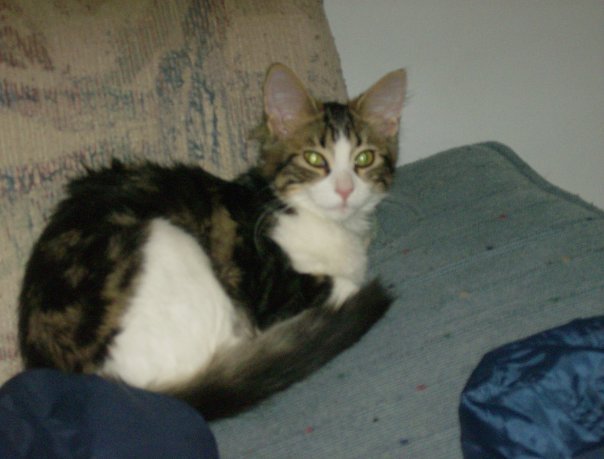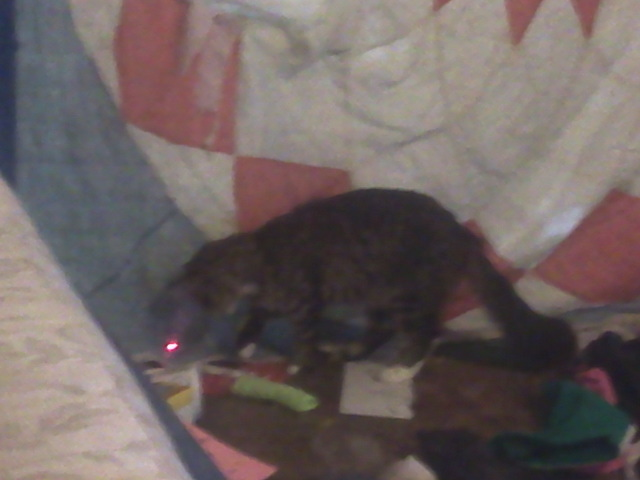Questioni have 2 house cats that stay away from each other and alternate rooms . my older cat's litter box is under a vanity i put something under then vanity so my cats litter wont go everywere but left it were my cat could go in and out and still smell her litter. my older cat is 6yrs old and she urniated 2 times in one week in my bed and has never done this before. i was told that she didnt on purpose. so i guse my question is she just getting older too and what can i do to make sure this dosnt ever happen?
Answerdj645,
You should begin trying to fix this issue by taking the cat that is urinating on your bed to the vet to make sure that there are no medical reasons why she may be urinating outside of the litter box Since you don't mention the ages of your cats or whether they are spayed and neutered I am not able to provide as detailed an answer as I would like to. If your vet gives your cats a clean bill of health then it is time to look at potential causes. Cats are very territorial and they aren't fond of changes.
If you have recently changed brands of kitty litter or the type that you use this could potentially be a part of the issue. If you use an air freshener in the area of the litter boxes or you use a scented kitty litter it is possible that your cats may be sensitive to scents in the same way that some people are. If you are concerned about litter box odor it is essential to clean the box a minimum of once daily to prevent the cats from looking for cleaner places to eliminate. From a cat's perspective a dirty litter box is similar to how most people feel about a filthy public washroom. Cats are very clean and they don't want to get urine or feces on them when they use the box. If you have changed anything within the household for example, laundry detergent, adding/subtracting a member of the family (doesn't matter whether the family member is human or animal), changing shifts at work, using a different soap/shower gel and/or using an air freshener that the cats are sensitive to, some cats will respond to changes in their environment due to the fact that they are very territorial and they feel much safer if their environment is predictable and they know what to expect in their territory.
The most important step to changing a behavior is to find out what the specific change is that is bothering the cat - you mentioned that you placed something near the litter box to prevent tracking that may be the issue or she may be uncomfortable if you changed the way that her litter box is facing. The most important things are to use a cleaner that will completely remove the smell of urine permanently and completely as well as to put things back the way that they were (not possible in the case of a death in the family or a family member moving out, but if it is the litter box issue easily corrected) and begin making the changes very slowly and gradually so that your cat will be more willing to accept them.
The best way to completely remove the odor and stain from an area that your cat has eliminated on is to use a product called an enzymatic cleaner. The way that an enzymatic cleaner works is by using beneficial bacteria to digest stains and odors of organic substances including urine, feces, blood and vomit. I have found that a product called Petzyme is versatile enough to clean furniture and carpets as well as having instructions about adding the proper quantities (in addition to your regular detergent) to your wash to clean machine washable items. Petzyme is very well priced and quite effective, you can find it at Petsmart if you live in Canada or the US, it will cost about $20 CAN for the gallon sized jug. The best way to prevent your kitty from urinating in the same spot because she can smell previous accidents is to thoroughly clean your mattress and bedding by using an enzymatic cleaner according to the directions on the label. If your bedding is machine washable I would recommend that you wash it in the hottest water that your fabric can safely be washed in and add the amount of enzymatic cleaner that the label recommends to your usual detergent.
You may want to consider purchasing a washable incontinence pad to place under your sheet to prevent damage to the mattress after you have washed the appropriate spot on the mattress with an enzymatic cleaner and allowed it to dry. You can usually find reusable incontinence pads in home health care sections of pharmacies or through your local medical supply wholesaler. When you place the clean bedding onto your bed you can either place a dish of cat food onto the spot that your cat has been urinating on (cats won't normally eliminate where they eat) to deter her from having another accident on your bed. I would recommend that you consider buying a synthetic pheromone product like Feliway in a plug in or spray form as cats aren't likely to use urine or feces to mark territory that they have marked using pheromones. You won't be able to smell the pheromones, but your cat will be able to. If your cats aren't spayed or neutered this may also account for the litter box issues.
Spaying and neutering is fairly effective in preventing many common behavioral and medical issues. Cats that are spayed or neutered are far less likely to use urine or feces to mark their territory due to the fact that their sex hormones are missing. Spayed and neutered pets are also far less likely to wander or fight. All too often pregnant cats, intact male cats and litters of kittens are admitted to animal shelters, abandoned or euthanised by private veterinarians due to preventable circumstances. Cats and kittens admitted to shelter systems are all too often euthanised simply because time or space ran out. Abandoned cats often suffer horrible deaths. It isn't uncommon for an abandoned cat to starve to death, be attacked by a predator (raccoons, dogs, coyotes, etc), be poisoned accidentally or deliberately, become victims of animal cruelty or die of injuries sustained by being hit by a car. Spaying and neutering saves lives by reducing the serious incidences of behavioral issues and preventing unwanted/unplanned litters from being born. Cats who have been spayed or neutered also enjoy several health benefits. By removing the sex organs the production of sex hormones is stopped. Infections in the mammary glands or reproductive organs are quite uncommon in spayed/neutered cats. Spaying and neutering significantly lowers risks of prostate and mammary (breast) and prevents testicular, ovarian, and uterine cancers. If you haven't had your cats spayed/neutered I would like to reassure you about the safety of these procedures. Human anesthetics and pain killers are used by most veterinarians to increase the safety of routine operations like spaying or neutering. As with any surgery whether it is performed on a person or their pet there will always be a small chance that something could go wrong, but generally these procedures are so routine that very few animals have complications or die due to the anesthesia. If your vet closes the surgical wound with external stitches then your pet may be fitted with an Elizabethan or "lamp shade" collar to prevent them from pulling stitches out or causing irritation that may prevent the surgical site from healing.
I hope that you have found this information helpful. If you have any further questions or concerns, or you would simply like to send an update or some pictures my way, please don't hesitate to contact me again.

 pregnat cat ??
Questionsophia
QUESTION: no one is avaible for t
pregnat cat ??
Questionsophia
QUESTION: no one is avaible for t
 18 yr old male cat
Question
Simon at 13 years
My cat is 18 years ol
18 yr old male cat
Question
Simon at 13 years
My cat is 18 years ol
 dones my cat sweet pea look pregnant?
Question
sweet pea sweet pea nipples
Hi w
dones my cat sweet pea look pregnant?
Question
sweet pea sweet pea nipples
Hi w
 My 12 year old indoor/outdoor male escaped 2 weeks after a recent move
QuestionEefa and our lost blac
QUESTION: We trie
My 12 year old indoor/outdoor male escaped 2 weeks after a recent move
QuestionEefa and our lost blac
QUESTION: We trie
 Throwing Up and Pooping
Question
Pepper
Hi,
Well my cat is 12 years old and la
Throwing Up and Pooping
Question
Pepper
Hi,
Well my cat is 12 years old and la